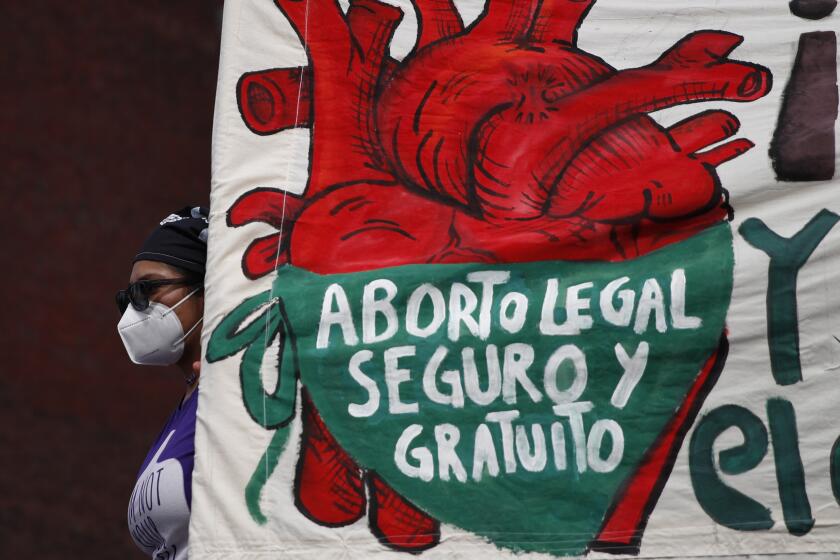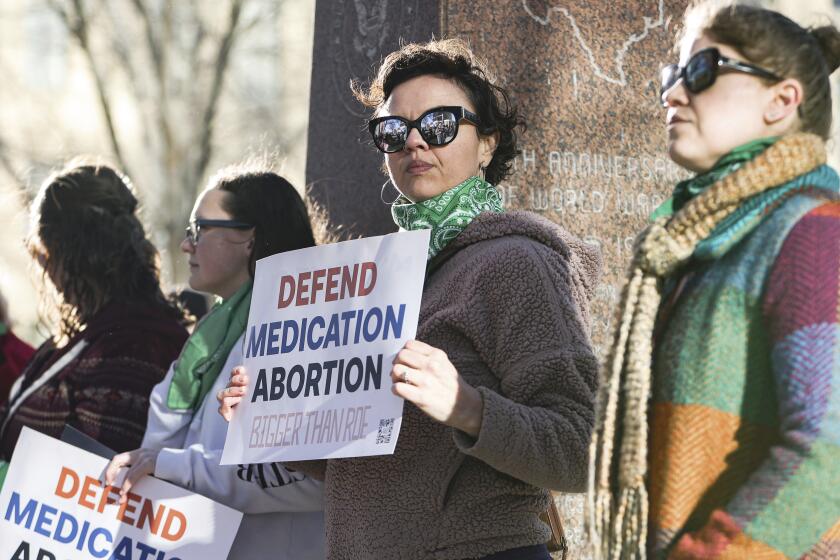Editorial: Abortion opponents’ latest tactic: Try to keep people trapped in states where abortion is illegal

- Share via
Abortion opponents aren’t satisfied just getting abortion banned or nearly banned in various states. They want to make it as difficult as possible for people to get help leaving their state to go to another where the procedure is legal.
So opponents have been turning their sights on private abortion funds that have been set up in states that prohibit or severely restrict abortion. The funds, which are nonprofits that depend on donations and philanthropic grants, have been a lifeline to pregnant people who cannot afford to travel to a state that allows abortion and to pay for the procedure.
It’s heartening to witness the progress Mexico has made in restoring reproductive rights — and it’s maddening to see the destruction of those rights continue in the U.S.
Some of these funds, in states with abortion restrictions and bans, have to deal with local officials and state legislators scheming to find ways to shut them down or intimidate them into shutting down. Once threatened, the funds may have little choice but to stop providing funds until they can figure out legally how to proceed. The Yellowhammer Fund, which does advocacy work and provides financial assistance to people in Alabama, Mississippi and the Florida Panhandle seeking abortions or advice, filed a lawsuit in July against Alabama Atty. Gen. Steve Marshall after he threatened to sue abortion funds or other organizations providing help. The lawsuit argues he has interfered with the Yellowhammer Fund’s constitutional rights as well as those of pregnant Alabama residents who want to exercise their right to travel out of state.
Funds in Texas have been particularly imperiled. In the wake of the Supreme Court’s June 2022 decision overturning Roe vs. Wade, a group of Texas-based funds brought a lawsuit against the state’s Atty. Gen. Ken Paxton and local prosecutors. The funds allege that state officials had threatened to pursue criminal charges against them for providing resources to people to get an abortion outside the state. (None of the funds subsidize abortions in Texas, where the procedure is nearly completely outlawed.)
The ruling ignores good sense, sound medical judgment and more than two decades of safe usage around the world. Mifepristone has been used safely in the U.S. for more than 20 years.
The funds argued the officials’ threats had chilled professionals “from providing counseling, financial, logistical, and even informational assistance to pregnant Texans” and violated their 1st Amendment rights.
Only when U.S District Judge Robert Pitman issued a preliminary injunction in February that stops prosecutors in eight counties from criminally charging abortion funds in Texas did most of them resume providing financial assistance. Still, the abortion opponents managed to slow the funds’ work and that is clearly part of what they wanted.
But that injunction didn’t stop the intimidation. One of the defendants in the funds’ lawsuit — Shannon Thomason, the former mayor of Big Spring, one of several Texas cities that declared themselves a “sanctuary for the unborn” — requested, as part of legal discovery, information about the funds’ donors, staff, volunteers and the names of doctors who have provided abortion care to Texans out of state. Thomason also asked each fund to identify the date of every abortion they have facilitated since Sept. 1, 2021.
The ruling ignores good sense, sound medical judgment and more than two decades of safe usage around the world. Mifepristone has been used safely in the U.S. for more than 20 years.
This is another outrageous attempt to rattle reproductive rights advocates. It would provide information to people who may try to target donors or staff under the notorious Senate Bill 8, which allows private citizens to sue people for helping Texans get an abortion.
The funds’ lawyers have filed for a protective order against having to answer any of these invasive questions, arguing that this information is constitutionally protected.
The Supreme Court decision overturning Roe vs. Wade said states could decide whether abortion was legal in their states. It did not make pregnant people captives of their state legislators and state prosecutors. It did not give state officials license to concoct ways to block funders and advocates from working to protect reproductive rights — even in states such as Texas. Last we looked, funding and advocacy remain activities permitted in the United States. Courts should make sure they vigorously protect those activities from intimidation wherever it crops up.
More to Read
A cure for the common opinion
Get thought-provoking perspectives with our weekly newsletter.
You may occasionally receive promotional content from the Los Angeles Times.












